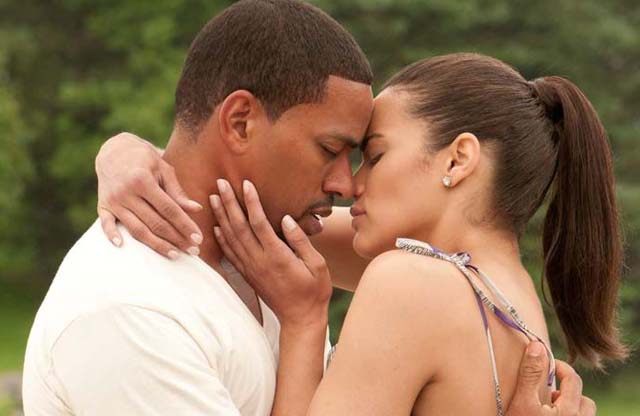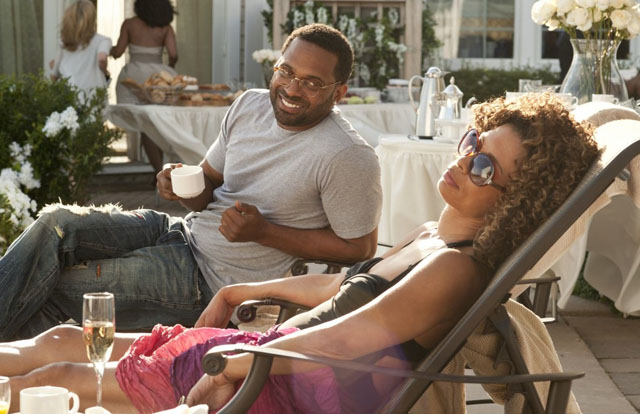CHICAGO – In anticipation of the scariest week of the year, HollywoodChicago.com launches its 2024 Movie Gifts series, which will suggest DVDs and collections for holiday giving.
No Leap of Faith to Enjoy ‘Jumping the Broom’
 Rating: 3.5/5.0 |
CHICAGO – There is a tradition within the African American community during weddings. It stems from the past, when marriage was deemed illegal for the race, and provides the title for a new film, “Jumping the Broom.” The now symbolic gesture is the basis for a clash between families and social classses in one seriocomic marriage weekend.
The situation immediately engages by putting a new spin on an old situation, the interaction between a bride and groom’s families. In this scenario the bride’s family is overtly wealthy, while the groom has a more middle class structure. Misunderstandings spring from this distinction, but also the truths that are revealed become more stark in light of the emotional wedding sensitivity, with a lot of decent laughs thrown in.
Sabrina Watson (Paula Patton) makes a promise in prayer that she will not sleep with another man unless it is on her wedding night. This sets up the meet-cute between her and Jason Taylor (Laz Alonso) – she runs him down with her car – and a relationship blossoms where somehow Jason goes along with the promise. Five months into the coupling, Sabrina gets a big promotion and a move to China, so Jason pops the question and the wedding is on.
This causes a bit of a problem as Jason’s mother (Loretta Devine) who has missed an earlier opportunity to meet Sabrina’s parents (Brian Stokes Mitchell and Angela Bassett). will only get that first meeting on the weekend of the wedding, a tony affair at the Watson family home in the Hamptons. Mrs. Taylor’s middle class roots clashes with the Watson wealth, and it doesn’t help that she has gone through anger management classes.
 Photo credit: TriStar Pictures |
Family and friends gather. Willie Earl Taylor (Mike Epps), Jason’s uncle, brings his devil-may-care attitude into the fray, while the bride’s young cousin Sebastian (Romeo) has eyes for Mother Taylor’s older best friend Shonda (Tasha Smith). Sabrina’s bridesmaid, Blythe (Meagan Good), starts making time with the catering chef (Gary Dourdan), and Sabrina’s Aunt Geneva (Valarie Pettiford) comes with some baggage, and it isn’t contained in her suitcases.
All of these events swirl around the couple, who with their short time together start to feel the pressure as the big moment arrives. If they can survive their relatives and some inopportune secrets, maybe they will jump the broom.
The broom actually becomes the implement of contention, as Jason’s mother wants it in the ceremony and the couple want their own traditions, which doesn’t include the jump. There is a somewhat shocking encounter during the rehearsal dinner where this conflict is argued, when Angela Bassett’s Mrs. Watson contends that her family actually owned slaves. This is the kind of different spin the movie has, making points of pride in class warfare rather than cultural diffences. In a way it shows how African American life has evolved post the civil rights era.
The ensemble cast is strong and have a lot of fun. The former Lil’ Romeo does a good job with the May-December tease, even when the joke wears thin. Loretta Devine’s Mother Taylor rises above the unreasonableness that the script generates for her and deftly portrays the guilt of pushing a point-of-view too far. Angela Bassett plays the posh Mom with an icy resolve, projecting strength in the face of some burdensome secrets. Even when the narrative atmosphere becomes tense, the direction of the cast by Salim Akil creates an air of lightness in celebration.
Religion plays a larger role in this film than others, with one of the film’s producers part of a mega-church in Dallas (T.D. Jakes, who also has a small role as a preacher). Faith is on display, but not overwhelmingly so, more in the sense of how important the relationship with a higher power is for the lives of the characters, and is portrayed in the story as positive. How this trend will play out in other forms of entertainment outreach is to be determined, but in this film religion is integrated as a the tradition of heritage and family.
Two generations removed from the struggle for civil equality for African Americans, there are overt signs through the wedding weekend of the issues that have arisen from educational, moral and monetary divides within the community. Nobody in the story is looking down at anyone in the mingling of relations, but there are certainly distinctions to be made on all levels based on the station of life each individual has achieved, as in Dr. King’s dream to judge everyone based on the content of character. Doing the right thing involves empathy for each other within this wedding party, which in the end is the simple milk of human kindness and forgiveness, because we all have problems.
 Photo credit: TriStar Pictures |
Jumping the Broom isn’t perfect, the bride and groom characters take a back seat to the tensions created by the mothers, and come off blowing in the wind emotionally in their reactions. This proves, as in most weddings, it is the background circumstances that become more prevalent than the ceremony itself. There is also a little too much piled on in the narrative, and the resolutions are quick, perhaps quicker compared to how serious some of these problems are. In the end, it’s about what the title of the film means, and moving on.
And as a tale of the ramifications of family and relationships, Jumping the Broom does succeed, and has some winking-at-the-camera fun at the same time. For all the religion, familial politics and complications generated, how they all come together becomes the very definition of what family is.
 | By PATRICK McDONALD |


